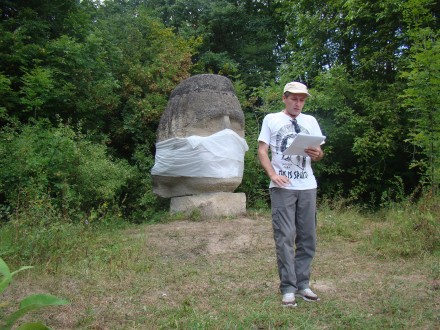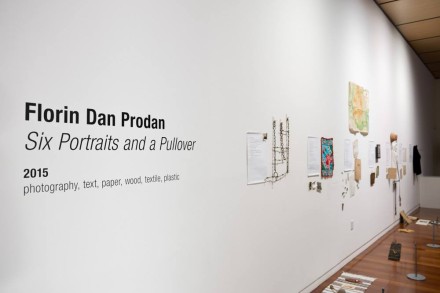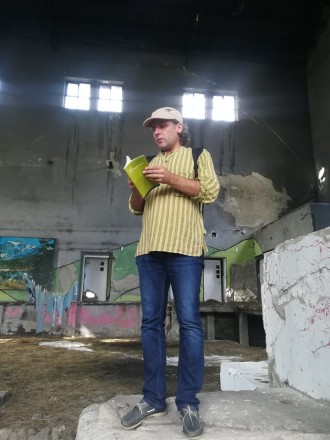David Greenslade: A Wall of Paper in Romania
Just as south Wales has several current, vibrant worksheds of poetic activity – Hafan Books (Swansea); Canalchemy (Pontypridd); Glasfryn Project (Llangattock) and Red Poets (Merthyr Tydfil) so too does northern Romania.
Florin Dan Prodan, based in Suceava, forty kilometres from the border of Romania with Ukraine, organises readings and workshops wherever he goes. He’s read and invited others to join him at the Poetry Café in London; Red Hook Art Space, New York; and for two years in a row he led the Romanian writers and Artists International Residency at a yurt village in Kyrgyzstan. Having arranged things when we met in Romania, I joined Florin soon afterwards for a reading at Caucasus House, Tbilisi, Georgia.
The Caucasus House event was typical of the way he does things. Hello, who’s around, who’s got transport, who’s nearby, how much are flights? Who runs the venue?
Radu Andriescu (poet, Romania) and Laura Arena (performance artist, New York) were also in Tbilisi and since they were on Florin’s extensive list of writer-artist contacts, they joined us. Florin Dan Prodan is notable not only for his ability to curate arts festivals seemingly at the drop of a hat – whether in an abandoned Carpathian ghost spa or at a working Astronomical Observatory – but also for championing the work of his Romanian contemporaries and getting them into translation. For twelve years he ran ‘Inside Zone’ an artists and writers residency dedicated to Andrei Tarkovsky, one of the longest running programmes of its type, with well over 100 participants from thirty seven countries. A typical long distance project of his, between Romania and Korea would be the Six Portraits and a Pullover, installation and performance, March-April, Korea Foundation Cultural Center, Seoul, South Korea, 2015.
The Pullover in question comes from one of Florin Dan’s poems.
The Pullover
Nobody remembers who owned the pullover
Who brought it to the Tirgu Ocna prison
If it was knitted by an old woman from the Carpathian Mountains
for her husband or son.
The owner probably died and someone else took it
On a cold winter night and confessed to the other
Tuberculosis sufferers that it cured him
And gave it to another sick prisoner.
Maxim wore it until December
And on Christmas it was warming the lungs
of old General Comarnu.
Professor Ilias kept it until summer when
Confidently, he passed it to
Pastor Wurmbrant, brought alive, only just,
From the hole of Jilava prison.
They struggled to dress him
His broken ribs were healing for the fourth time.
The pullover covered him like a shroud.
After the miracle, when they sent him to B?r?gan,
He bestowed it to a skinny student who was released wearing it
on August the 1st, 1964.
This is what sets Prodan’s poetry and their presentation well apart from his contemporaries. As in his collection Poeme si Note Informative Despre Eroi si Morminte (trans: Poems and Informative Notes about Heroes and their Tombs) he returns to the experiences of those who suffered under Communist oppression before Ceausescu came to power as well as later during the Ceausescu period.
The events his poems primarily invoke are those of the so-called Romanian Gulag era, between 1945 and 1964. These were the decades when Romania was ruled, more or less, by so-called Soviet Counsellors, principally KGB officers with almost complete control over politics and the economy. Then quite abruptly, without warning, on the 1st of August 1964 the concentration and labour camps as well as political prisons were closed and survivors freed.
Florin tells me that the best place to get some idea of the horrors of the Romanian Gulag is the Sighet Memorial Museum established by husband and wife poet/writers Ana Blandiana and Romulus Rusan. The museum is housed in a former political prison near the border with Ukraine. “Be prepared to be shocked,” he says, “in fact be prepared to be traumatized, it is not an easy experience, going there. The museum records KGB style executions – one bullet in the head, one for each person, nighttime, remote forests, mostly between 1944 and 1958.”
Nicolae Ceausescu when he came to power in 1965, continued the persecutions through his Securitate, albeit at an individual level and on a smaller scale. While punishments such as losing your job, house or liberty continued, because Charles de Gaulle and Nixon, during their visits, specifically asked him to stop them, political kidnapping and executions were less frequent than under the KGB.
The Ceausescus, she along with him, were feared for the arbitrary terror of their whimsical decisions – arrest of architects, tearing down historic buildings, the sacking of librarians, tv announcers, ordering female folk musicians to cut their hair, as well as the routine arrest of poets and artists. The grim irony is that many of these unsung heroes have no tombs. Here is another poem from the same collection.
The Robot
I am the robot nicknamed Tanu
my name was Alexandru Popa before.
I wrote poems
and I wanted to be a solicitor.
They hammered me to death
And turned my brain inside out.
I confessed everything and even more
All the thoughts I ever had
All the dreams I always dreamt.
I am a New Man now,
The one successfully retrained
In the Pitesti prison.
I re-educated all the inmates
in Gherla prison chamber 99.
I am a robot
of superior quality.
They are going to ask me
to retrain the whole nation.
As an organizer Florin clearly takes great delight in bringing groups together and allowing collaborations to unfold with minimum interference. It’s an approach that works. Writers from all across Romania and from further afield respond when messages go out that a field expedition is underway. As founder of the vibrant collective, Zidul de Hartie (lit. Wall of Paper) he has persuaded comrades to climb seriously challenging mountain peaks, rediscover communist-era sculpture parks and wander through the labyrinths of abandoned hotels. Zidul de Hartie is a ‘wall of paper’ in the manner of a tough origami fortress, changing shape and adaptable but with the quiet strength to make a literary structure work. As well as happenings, Zidul de Hartie also publishes the work of other writers.
Florin Dan Prodan, as well as receiving arts funding from distant places (Peru, Switzerland, Demark,) has won some of the most prestigious prizes in Romanian Literature, most notably the Lucian Blaga Prize. Blaga, considered one of the greatest Romanian poets ever, appears on the 200 lei banknote along with his short poem “Self Portrait”. This poem is the only example of a legible and complete poetic text appearing on currency. It is not lost on Florin Dan that Blaga was fired from his university post and that the Communist authorities saw to it that Blaga was not nominated for the 1956 Nobel Prize for Literature. The authorities even sending a delegation of official diplomatic thugs to Norway to make sure the nomination was stopped in its tracks.
The Writer
I am free again and back home
in my new motherland
The Socialist Republic of Romania.
I forgot the torture
the long years spent in prison.
I forgave one and all.
Now I have paper, a table
and a wood-burning stove.
But every time I sit down to write,
a terrible shadow looms above me
as if someone is leaning
over my shoulder.
Florin lives in Suceava contributing to that vibrant city’s sense of cultural modernity. Already well-known as a province where Byzantine Christianity is preserved and as a region that goes literally beserk during winter shamanic festivals, thanks to Zidul de Hartie, Suceava (city and province) is now also known for poetic experimentation and publications – a change of image that many people welcome. One event that I attended, well out in the countryside, south of nearby Iasi, attracted participants from as far away as the capital Bucharest. Highlights were broadcast on national radio.
Sometimes it takes a certain individual to persuade others that they can collaborate, they can co-translate and co-create. Florin Dan is one of these. He is not alone. Suceava city, as plain and as modest as it is, is home to other arts collectives. Suceava poet (and dentist) Doru Matei Mateiciuc has a poem in Imagined Invited, published in Wales, as does Luminita Amarie, sharing her time between London and Suceava. Both are very generous, accomplished writers having a positive influence on their contemporaries. George Cirstian is also a poetry organizer in Suceava with his collective Casa de Poezie, Light of Ink. Between them all there is no predicting when an individual or group reading might suddenly be announced on social media.
There is only one major factor that comes between Florin and his self-imposed, writing-curating obligations. Farming. He lives in the countryside and many times over the years he’s told me that he cannot meet, travel or contribute just at the moment because he has to pull potatoes, pick plums, pick grapes or walnuts or take sheep to market. Otherwise he is his own free agent, ready at a moment’s notice to organize a poetry festival at an eccentric venue located near you.
https://www.memorialsighet.ro/decretul-de-gratiere-nr-3101964/
http://www.napocanews.ro/2018/01/august-1964-ultimul-lot-ultima-zi-la-aiud-neinfrantii.html
David Greenslade writes in Welsh and English and shares his time between Wales and Romania. Delayed by Covid he now has several books appearing close together:- Ubquitext (Steven the Great University Editions, Romania 2021); City of Opal Altars (Mu?atini Press, Romania, 2021) and Full Pareidolia (CONTRABAND, 2021). He will have sponge-work in the next edition of Peculiar Mormyrid and can be seen reading maths poems at https://www2.math.uconn.edu/~glaz/Mathematical_Poetry_at_Bridges/Bridges_2021/The-program-and-the-poets-2021.html
LEAVE A COMMENT
From the Junction Box
- Contributors and Links to Pages 1- 4
- Editorial to Issue 17: The John James / Chris Torrance Special
- Gavin Selerie: Marks Outside the Spa
- Elisabeth Bletsoe: Two Poems and a Miscellany for Chris Torrance
- Allen Fisher: Leeks and Leaves for Chris Torrance
- Ian Brinton: Notes from a Correspondence with Chris Torrance
- Elaine Randell: Chris, Barry and Me
- Ian Davidson: Tripping
- Peter Finch: Torrance
- Tilla Brading: Pieces for Chris Torrance



